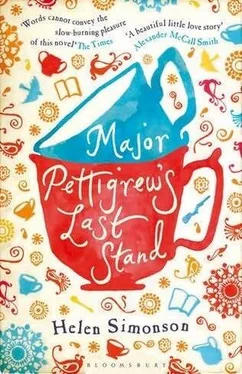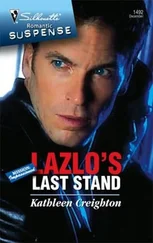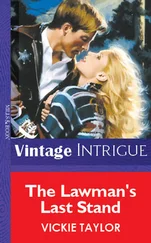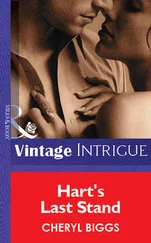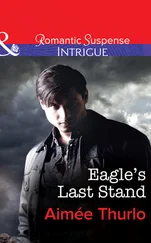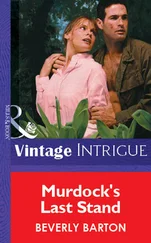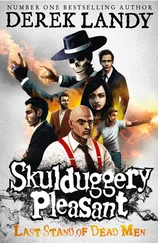“We’ll look ridiculous,” said the Major.
“Everyone looks ridiculous in the country,” said Roger. “The point is to join in so they don’t suspect you.” The Major was tempted to reward his son’s self-absorption with a box on the ear with the freshly scrubbed frying pan.
“Your father is just wonderful,” said Sandy as they sat over tea in the living room. “It’s so nice to meet someone real for a change.”
“We met one of the biggest art collectors in Europe this week,” said Roger. “Russian guy-he has an entire house on the edge of Regents Park.”
“I don’t think your father would have liked it much,” said Sandy.
“He has six Picassos and amethyst handles on all the taps in the toilets,” said Roger. “Ten minutes of chatting with him, and Sandy had an order for an entire new wardrobe of clothes for his girlfriend.”
“I do admire a man who doesn’t do things by halves,” said Sandy.
“You should call her, darling, and see if we can wangle a lunch invitation,” said Roger.
“Oh, God, Roger, not lunch,” said Sandy. “Lunch requires conversation. I don’t think I can sustain a whole hour of listening to her catalog her handbags.”
“It’d be worth it if we get on the list of people invited to their private tent at the art fair,” said Roger. “If we work ’em right, we could be yachting in the Black Sea next summer, or at least invited down to Poole for the weekend.”
“In my day I don’t think we ever felt the need to ‘work’ our social contacts in such a manner,” said the Major. “It seems a bit gauche.”
“Oh come on, it’s always been the way of the world,” said Roger. “You’re either in the game, making the connections, or you’re left in the social backwoods, reduced to making friends with-well, with shopkeepers.”
“You’re very rude,” said the Major. He felt his face flushing.
“I think your father has the right idea,” said Sandy. “To be interesting, you have to make contacts in all sorts of worlds. That way you keep people off guard.”
“Sandy is a real master at making friends with people,” said Roger. “She has everyone convinced she really likes them.”
“I do like them all,” said Sandy, blushing. “Okay, maybe I don’t like the Russian. We may have to rent a canoe if you want a boating holiday.”
“She has my boss’s wife eating out of her hand. One minute I can’t get a cup of coffee with my boss, and the next, he’s asking me to go shooting with him and a client,” said Roger. “Never underestimate the power of the female Mafia,”
“I seem to remember a small boy blubbering over a dead woodpecker and vowing never to pick up a gun again,” said the Major. “Are you really going shooting?” He leaned toward Sandy and poured her more tea. “Could never get him to come out with me after that,” he added.
“Yeah-like ‘bring Woody’ is a great invitation,” said Roger. “It was my first shoot and I potted an endangered bird. They never let me forget it.”
“Oh, you have to learn to shrug these things off, my boy,” said the Major. “Nicknames only stick to people who let them.”
“My father.” Roger rolled his eyes. “A great believer in the cold-baths-and-blistering-rebuke school of compassion.”
“Roger is going shooting now,” said Sandy. “We had to spend three hours in a store on Jermyn Street, getting him the proper outfit.”
“An outfit?” asked the Major. “I could have lent you a pair of breeches and a jacket.”
“I got everything I needed, thanks,” said Roger. “Except a gun, of course. I was hoping I could borrow yours and Uncle Bertie’s.” The request was smoothly made. The Major set down his cup and saucer and considered his son’s placid face with equal parts curiosity and rage.
Roger betrayed no hint that he understood the effrontery of the request. It was of no more significance to him than asking to borrow some spare wellies during a rainstorm. The Major pondered how to produce a response that would be blunt enough to make an impression on Roger.
“No.”
“I’m sorry?” said Roger.
“No, you may not borrow the guns,” said the Major.
“Why ever not?” asked Roger with round eyes. The Major was about to answer when he recognized that his son was tempting him into explanations. Explaining would then simply open negotiations.
“Let’s not discuss it in front of our guest,” said the Major. “It is out of the question.” Roger stood up so quickly that he slopped tea into his saucer.
“How come you always have to undermine me?” he asked. “How come you can never just put yourself out to support me? This is my career we’re talking about.” He banged down his teacup and turned away to look into the fireplace, clenching his hands together behind his back.
“I’m sure your host has arranged some perfectly adequate extra guns,” said the Major. “Besides, as a novice, you would look ridiculous banging away with such a valuable pair. You would look absurd.”
“Thank you, Father,” said Roger. “Nice of you to be as frank as usual about my limitations.”
“I’m sure your father didn’t mean it that way,” said Sandy, looking as if she had suddenly remembered why business acquaintances were, after all, preferable to family.
“I’m just trying to keep you from looking foolish,” said the Major. “What kind of shoot is this, anyway? If it’s clay shooting, they often have just the right equipment.”
“No, actually it’s a local country thing,” said Roger. He paused as if reluctant to say more, and a horrible premonition came over the Major. He debated stuffing his fingers in his ears so he would not have to hear Roger’s next words.
“I told Roger you’d be happy for him,” said Sandy. “But he’s been concerned all week that you might feel offended that after all these years he gets an invitation instead of you.”
“I’m shooting with Lord Dagenham next week,” said Roger. “Sorry, Dad, but it just came about and I couldn’t exactly say no.”
“Of course not,” said the Major. He was stalling for time as he counted up his options. He wondered briefly whether Roger and he could get through the day without having to acknowledge each other. He then considered the advantages of saying nothing now and then acting surprised to meet Roger on the day, but dismissed the idea since Roger could not be relied upon to supply a dignified response to such a fiction.
“I wanted to ask Gertrude about adding another person, but I believe only a certain number of guns can be accommodated,” said Roger. “I thought it wasn’t polite to press them.” He blushed and the Major saw with some wonder that embarrassment about one’s relations went both up and down the generations. He was mortified at the thought of Roger waving a shotgun around, and for just an instant he saw himself explaining a dead peacock on the lawn. However, the Major accepted the futility of trying to hide his connection with Roger. He would just have to keep an eye on him.
“Oh, no need to worry about me,” said the Major finally. “My old friend Dagenham asked me some time ago to come and help him beef up the line.” He paused for greatest effect. “Said we needed some old hands to show you London chaps how it’s done.”
“That’s wonderful,” said Sandy. “I’m so glad it all worked out.” She stood up, adding, “Excuse me,” and gave the vague wave which seemed to the Major to be the universal female signal that a moment will be taken to freshen up.
“I’m looking forward to giving the old Churchills a good day’s work,” said the Major, also standing as Sandy left the room. “You should stick with me, Roger, and that way I can toss a few extra birds in your bag if you need them.” Roger, as he closed the door behind Sandy, looked sick to his stomach, and the Major felt he might have gone too far. His son had never been able to stand up to much of a ribbing.
Читать дальше
